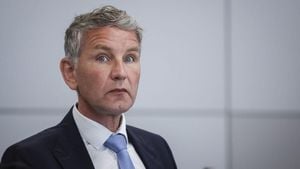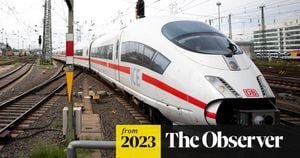Volkswagen (VW) has been caught in the throes of significant labor unrest as more than 100,000 workers initiated strikes across its factories in Germany. This dramatic action unfolded against the backdrop of rising tensions between the automaker’s management and its largest labor union, IG Metall. Amid cries of discontent, VW CEO Olivier Blume addressed the crowd with stark realities, emphasizing the financial pressures and impending plant closures. Blume’s message, met with boos and disapproval, indicated the depth of unease among employees.
On Monday, workers at nine VW factories, including the prominent electric vehicle-only site, halted production, intensifying the already fraught negotiations about pay cuts and job security. Blume depicted the challenges facing VW with somber honesty, stating, "We are not operating in a fantasy world," reminding employees of the harsh realities of their industry.
The current strikes represent VW’s first serious labor conflict of this scale in its 87-year history within Germany. The company is pushing forward with plans to cut thousands of jobs and close at least three facilities, actions deemed necessary to cope with declining sales and fierce competition, primarily from Chinese automakers.
Blume noted the immense pressure on pricing, reitering, "The price pressure is immense," particularly highlighting the challenges presented by the Chinese market, which is VW’s largest. The hourly wage for automobile workers in Germany is, roughly €33.05 ($34.69), significantly higher than their counterparts in China, where wages range from ¥14 ($1.93) to ¥31 ($4.27) per hour. This stark difference heightens the pressure on German automakers to cut costs, leading to the current union conflict.
The discontent among VW workers isn't without foundation. Negotiations have seen the company remain steadfast about its austerity measures, which include slashes to employee wages by 10% for those who remain on staff after the cuts. Union representatives maintain they have alternative strategies to manage costs without resorting to layoffs, echoing the workers’ frustration with management’s unwillingness to explore all avenues.
According to IG Metall, the union suggested fiscal strategies and emphasized the risks of losing skilled labor—which could prove more costly and time-consuming than maintaining current employment levels.
Despite the protests and strikes, reports suggest there’s been no impact on operations at the Volkswagen plant located in Chattanooga, Tennessee, where workers are unrepresented by unions. The threats of job cuts loom large over the factories, increasing the urgency of negotiations set for December 9.
Under the shadow of strikes, VW’s leadership is experiencing turmoil as well. CEO Oliver Blume’s annual compensation of about $10 million has drawn dissatisfaction from labor representatives, especially as pay cuts for the workforce loom. Daniela Cavallo, head of VW’s labor council, highlighted stark disparities, stating, "The sacrifices should apply to everyone, including management and shareholders."
This turmoil aligns with wider concerns within the automotive industry, signaling possible disruptions not just for Volkswagen but for several key players, as reports reveal GM and Ford are also wrestling with financial pressures and workforce negotiations. With economic conditions rapidly changing, the auto industry faces uncertainty about how these disputes and transitions will evolve.
The pressures on VW underline the immense shifts occurring within the automotive sector. Companies are reevaluated as competition stiffens, especially from Chinese firms entering the European market. The outcomes of these labor negotiations could set significant precedents for how the automotive industry navigates cost structures and employee relations going forward.
Volkswagen’s struggles serve as both a warning and lesson about adapting to the rapidly changing global economic environment. How the CEO engages with internal pressures, as well as the company’s overall survival strategy, could shape the future narrative of one of Germany's most iconic manufacturers, as they brace for the challenges presented by both labor and market competition on the horizon.



